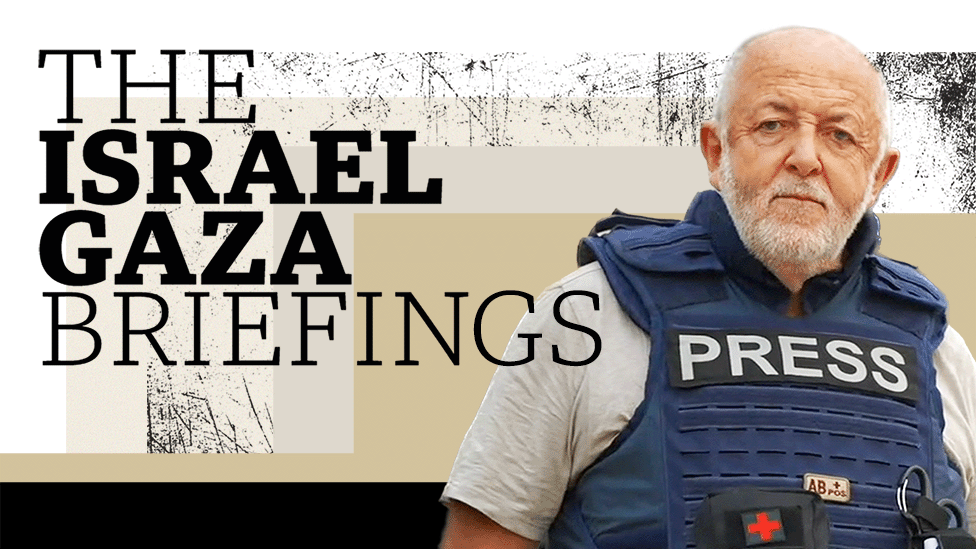Can US pressure deliver Israel-Hamas truce in Gaza?
- Published
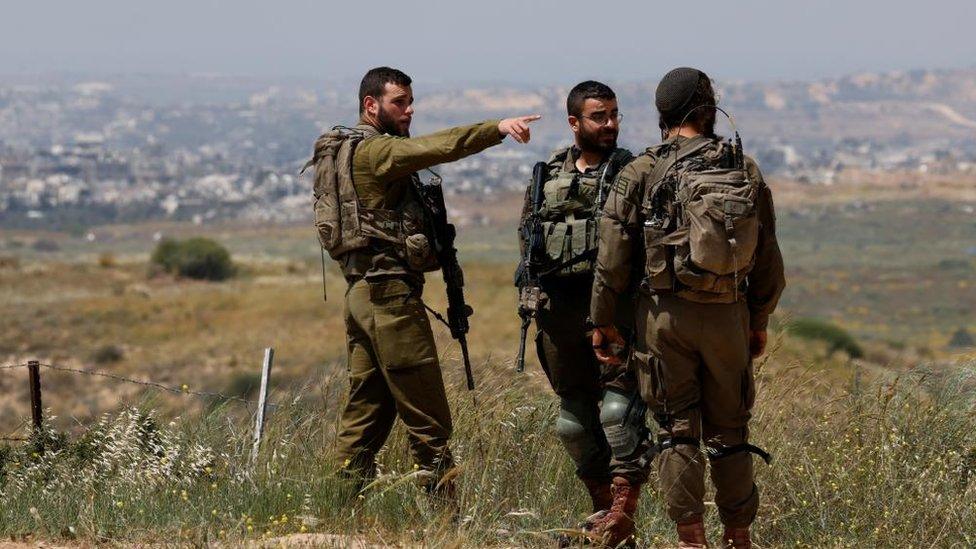
Israel has withdrawn most troops from southern Gaza - but it is not being interpreted as an end to the war
A truce between Israel and the Palestinian group Hamas in Gaza was never going to be easy. Weeks of talks have failed to produce agreement. But international pressure is growing.
Perhaps the biggest sign is the Biden administration sending William Burns, the head of the CIA, for the latest round of talks in Cairo.
Hamas has, in public at least, stuck with its initial demands of a permanent ceasefire, the complete withdrawal of Israeli troops and the return of displaced Palestinians to northern parts of the territory without restrictions.
Israeli Prime Minister Benjamin Netanyahu meanwhile insists that Israel will continue fighting until Hamas is destroyed and hostages the group is holding are free.
"There's a lot more American pressure on Israel, and on Egypt and Qatar to put pressure on Hamas. That's obvious," said Gershon Baskin, who helped negotiate a deal with Hamas for the release of Israeli soldier Gilad Shalit in 2011.
"The fact that the head of the CIA showed up, which required all the negotiators to be there at the highest level. That's indicative of increased American pressure."
But that does not mean a deal is at hand.
Israeli officials have indicated willingness to make some concessions amid intensifying frustration among the country's main allies, including the US. Earlier this week, the Israeli defence minister, Yoav Gallant, suggested that now was the right time for a truce.
Any deal is expected to see the release of some of the hostages captured in the Hamas attacks in return for Palestinian prisoners being held in Israeli jails, which was the basis for a truce that led to a temporary pause in hostilities in November. According to Israeli authorities, 133 people remain captive in Gaza, although at least 30 have already been confirmed dead.
Under the latest US proposal, an initial phase of a six-week ceasefire would see Hamas release 40 hostages who are alive, with the priority being given to female captives including soldiers, men over the age of 50 and those with serious medical conditions.
Israel would then release at least 700 Palestinians, including about 100 who are serving life sentences for killing Israelis, which has proved controversial in Israel in the past.
But Hamas has reportedly told negotiators it is not holding 40 people in this category, raising the prospect that many more hostages than previously thought have died or that they could be in the hands of other armed groups, such as Palestinian Islamic Jihad.
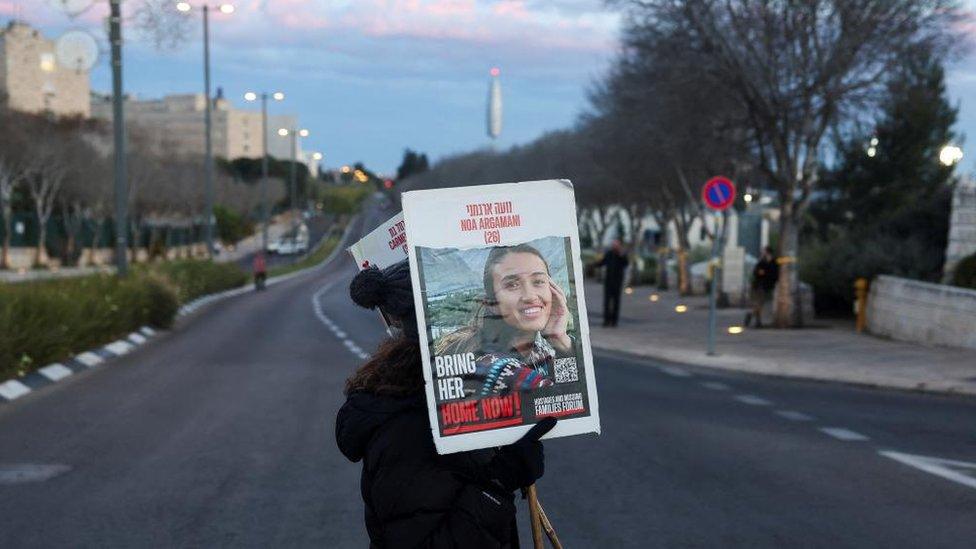
Hostage families say Mr Netanyahu is more concerned with his political survival than their loved ones' plight
In Israel, Mr Netanyahu's room for manoeuvre is limited by pressure from different parts of society and politics. While most of the Israeli public remain supportive of the war, there are growing calls for him to agree to a deal for the release of the hostages.
The families have held large protests, accusing the prime minister of not making the captives' return a priority and of being more concerned with his own political survival. Calls for Mr Netanyahu to resign are on the rise too.
Divisions have intensified within Mr Netanyahu's governing coalition, which includes far-right, ultranationalist allies who refuse concessions to Hamas and insist the war must go on.
Finance Minister Bezalel Smotrich told the prime minister that increasing pressure on Hamas was the only way to bring the hostages back and destroy the group, while National Security Minister Itamar Ben Gvir explicitly threatened to bring down Mr Netanyahu himself if he did not go ahead with a much-promised offensive into the city of Rafah, in southern Gaza.
Israeli officials insist it is essential to enter Rafah, where, they say, Hamas has four operational brigades and its senior leaders could be hiding.
But virtually everyone outside Israel is against an offensive in the city, where about 1.5 million Palestinians are sheltering in tents, improvised shelters and overcrowded camps, over concerns of the catastrophic impact it could have on civilians.
In what could have been an attempt to counter domestic criticism, on Monday, Mr Netanyahu said a date had already been set for a Rafah operation, without giving details.
"There's a revolt going on right now in the government, and within [Mr Netanyahu's party] Likud, against Netanyahu making any kind of deal that they don't think should be made," Mr Baskin said.
"Netanyahu is not a free actor. He's a hostage himself within his own government."
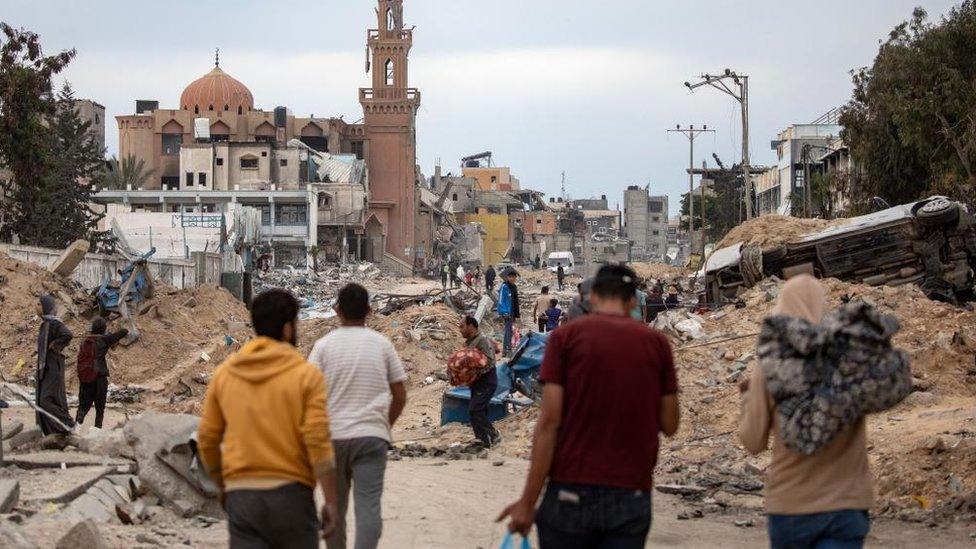
Hamas may believe time is on its side despite the dire humanitarian situation in Gaza
For its part Hamas has yet to give a formal response to the latest proposal, but said that while it was interested in an agreement "that puts an end to the aggression on our people", the offer did not meet its demands.
"The Israeli position remains intransigent," the group said in a statement.
The White House described the group's response as "less than encouraging".
A final decision will probably be made by Yahya Sinwar, the Hamas leader in Gaza who is thought to be hiding in tunnels surrounded by guards and hostages. But communications with him are difficult and said to involve several intermediaries and take days.
The group, Mr Baskin said, was also demanding more say in which Palestinian prisoners would be released and that it would not agree to any of them being deported to another country, issues that could present obstacles to negotiations.
Hamas also believes that without guarantees of a permanent ceasefire, Israel will continue to attack the group once the hostages are released.
Its leadership has witnessed growing international criticism of Israel and may believe time is on their side to secure concessions, despite the overwhelming and immediate needs of Gaza's devastated civilian population.
The war in Gaza, Israel's response to the Hamas attacks on 7 October that killed about 1,200 people, has killed more than 33,000 Palestinians, according to the Hamas-run health ministry, destroyed large parts of the territory, and left many on the brink of famine.
"From my experience in dealing with these things, the main difficulties are whether or not the main decision maker on both sides is ready for a deal. That's not clear," Mr Baskin said.
"It's not clear that Netanyahu is ready for a deal, it's not clear that [Hamas political leader in Gaza Yahya] Sinwar is ready for a deal. But when they are, they will find the middle ground."
Perhaps unsurprisingly, a Hamas spokesperson seized on Mr Netanyahu's comments about setting a date for an attack on Rafah, saying it raised questions about the purpose of resuming negotiations.
Related topics
- Published6 April 2024
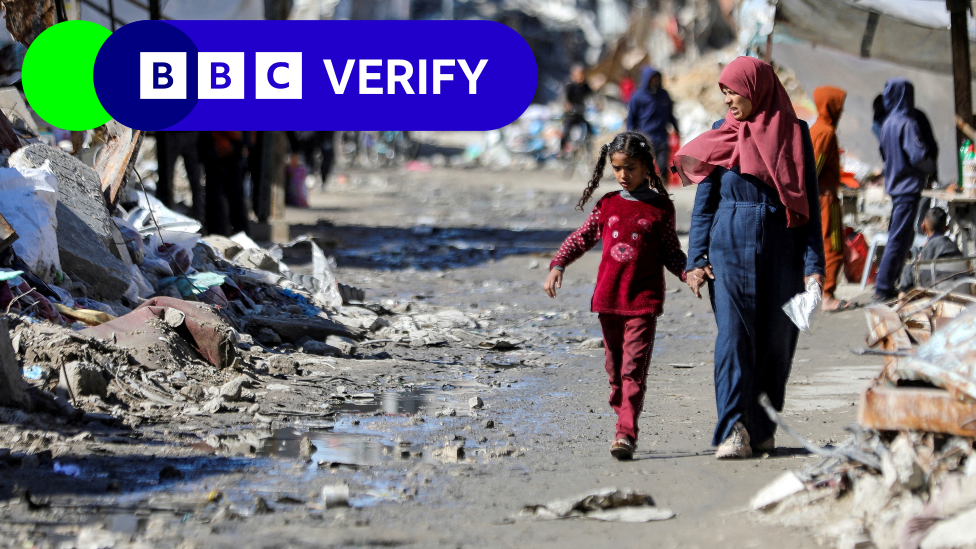
- Published7 April 2024
